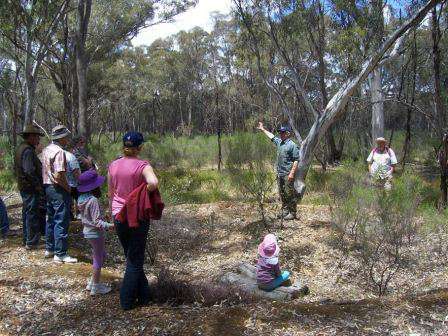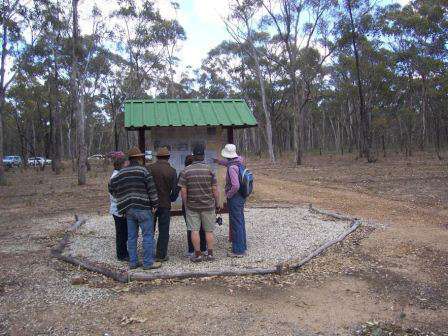Twenty-seven people enjoyed a fabulous and informative day recently in the Heathcote-Graytown National Park with presenter David Meagher who is a lecturer on the social and natural environment at the annual Box Ironbark Ecology Course.
Twenty-seven people enjoyed a fabulous and informative day recently in the Heathcote-Graytown National Park with presenter David Meagher who is a lecturer on the social and natural environment at the annual Box Ironbark Ecology Course.
The field day was jointly organized by the Whroo Goldfields Conservation Management Network (CMN) and the Department of Sustainability and Environment (DSE) Land for Wildlife Program.
David's specialty is botany, but he also has a strong interest in the human history of the Box Ironbark forests, and how human behaviours and actions have shaped the forest we experience today.
Whroo Goldfields CMN Coordinator Ms Janice Mentiplay-Smith in describing the impact of David's presentation explained, "David was able to help how we view the forest and gave us a fresh understanding of just how much humans have altered the landscape."
The Group met at the Prisoner of War Camp ruins, in Graytown and heard about how the site once housed up to 150 internees/prisoners of war; mostly Italian and some Germans. Each day they cut 90-100 tonnes of firewood to supply the endless demand of fuel from Melbourne.
From there the group visited the Graytown Cemetery which tells a sombre tale of mortality and hardships on the goldfields, as well as providing an example of tunnel erosion close by which shows how degraded the soils have become due to mining activity and subsequent erosion.
Spring Creek Gold Rush was famous around the world for its alluvial gold; finding large nuggets was not unusual. Surprisingly, in 1870, Graytown was as big as Ballarat and Bendigo in their day, and boasted a population of 30,000 residents. Shops, churches, schools, a post office, eight doctors, a concert hall, ninety hotels/grog shops and an aerated water plant (because Spring Creek – the town water supply – had become so polluted) made up the large town; looking around today it is hard to imagine that these places ever existed.
During the tour David also spoke of how 'worked over' the soils had become, and how during a large storm in 1870 tonnes of sludge washed over the goldfields, filling the mines and virtually halting all mining. Within six months Graytown was a ghost town, and a chapter of history was over. Buildings were packed up and moved either in pieces, or brick by brick, onto the next goldfield.
Field days like this help to raise awareness regarding how altered the landscape has become. They also bring together people from all aspects of life, who share an interest in the local region, and provide a great opportunity for meeting new neighbours. This field day was an event as part of Biodiversity Spring - Ninety Days of Nature events program run throughout Northeast Victoria. The Whroo Goldfields CMN and DSE would like to thank David Meagher for his time in preparing and leading this fascinating tour through the ecology and history of the Box Ironbark forests.
For more information on the Whroo Goldfields Conservation Management Network, and how you can become involved, contact CMN Coordinator Janice Mentiplay-Smith on 5761 1644 or janicem@gbcma.vic.gov.au or visit www.whroogoldfieldscmn.com For more information on DSE's 'Land for Wildlife' program, please call Kim Wilson on 03 5784 0600 or kim.wilson@dse.vic.gov.au

At the puddling machine, Spring Creek. Photo: Whroo Goldfields CMN.

Information board at Graytown Cemetery. Photo: Whroo Goldfields CMN.